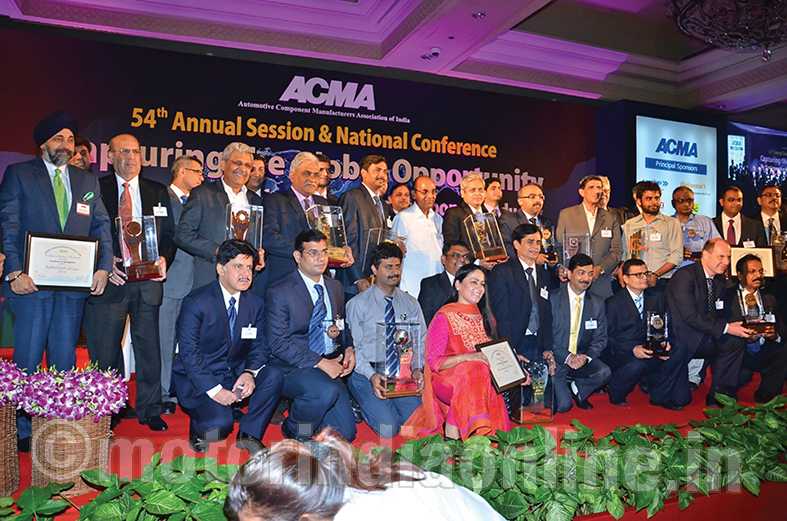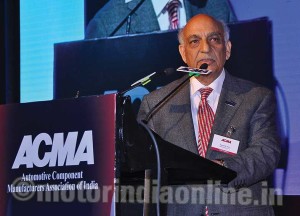The Automotive Component Manufacturers Association of India (ACMA) held its 54th Annual Session and National Conference in New Delhi on September 11, with the theme “Capturing Global Opportunities – The next imperative for the Indian auto component industry”.
The annual session was addressed by key ministers and functionaries from the Indian automotive industry, including Mr. Nitin Gadkari, Minister for Road Transport & Highways, Mr. Anant Geete, Minister of Heavy Industries & Public Enterprises, Mr. Sumit Mazumder, CII President – Designate, and Chairman & Managing Director, TIL, and Mr. Vikram Kirloskar, SIAM President, and Vice Chairman, Toyota Kirloskar.
Eminent speakers like Mr. Vinod Dasari, SIAM Vice President, and Managing Director, Ashok Leyland, Mr. Rajiv Bajaj, Managing Director, Bajaj Auto, Mr. Nigel Harris, President, Ford India, Mr. Jagdeep Singh Rangar, Managing Director, Stork Rubber Products, and Dr. Philipp Radtke, Director, McKinsey & Company, Munich, shared their views on the potential global opportunities and how Indian suppliers can harness them to their advantage.
In his address, Mr. Nitin Gadkari said: “The Indian auto component makers are doing a great service to the nation-building mechanism. The new Government under the guidance of the Prime Minister, Mr. Narendra Modi, is committed to enabling the best possible policy environment to double exports of Indian players for the global markets”.
Mr. Anant Geete said: “ACMA will lead from the forefront to bring together the Indian component makers and grasp the best of global opportunities. The various deliberations at ACMA’s 54th Annual Session would surely pave the way for converting many of these opportunities into a reality”.
Mr. Piyush Goyal, Minister of State (Independent Charge) for Power, Coal & Renewable Energy, observed: “The time has come when Indians can keep their head high and be proud of their offerings for the global markets. The auto component sector has the potential and grit to work amidst challenges and establish a stronger name in the global arena in line with the theme of ACMA’s 54th Annual Session”.
He also encouraged the components industry to become aggressive and start reaching out to the global markets, in addition to being globally competitive, with a special focus on product quality.
Mr. Harish Lakshman, ACMA President, said: “The auto industry is a critical cog in the wheel of the Indian manufacturing sector. As we aim to develop India as a global manufacturing hub we see a huge export potential in our domestic auto industry. This is the right time to invest in technology, innovation, training and resources to build the future”.
Mr. Ramesh Suri, ACMA Vice President, added: “ACMA will take all possible steps to engage with the government and at all possible levels to create an enabling policy environment for spurring growth in the auto component segment. It’s time the ACMA members geared up and explored growth opportunities in line with their specialisation”.
Mr. Sumit Mazumdar commented: “The new Government under the leadership of Prime Minister Narendra Modi has unleashed a new lease of optimism. The auto components industry in India had witnessed a challenging phase with slowdown in demand and flagging sales during the past two years. But, now the tide is turning towards a robust growth trajectory”.
According to Mr. Vikram Kirloskar, ACMA and SIAM are important stakeholders for the Indian automobile industry and are committed to jointly tap all possible opportunities for industry members both in the domestic and international markets”.
The joint ACMA-McKinsey study titled “Capturing the global opportunity – The next imperative for the Indian auto component industry”, which was also the central theme of the session, was released at the event by Mr. Anant Geete. The study findings suggest that globalisation in the auto suppliers industry is an irreversible trend and is likely to grow. There are five macro-trends which will drive this – globalising OEMs with suppliers following them, maturing low-cost countries (LCCs) as export hubs, platform consolidation and shift towards large global suppliers, increasing aspiration of emerging market suppliers to access new markets, and technologies and market diversification for margin resiliency.
The study also identifies and suggests that Indian suppliers are well positioned to benefit from these global trends and can significantly accelerate their international presence in the next few years. Based on market comparisons, supplier and OEM surveys, the Indian suppliers can nurture a three-pronged 2020 aspiration – increase exports from the current $10 billion to $35-40 billion, increase revenues from overseas assets from the current $6 billion to $20-22 billion, and increase the count of Indian suppliers in global top 100 from the current lone figure to five by 2020.
The year gone by has been one of the most challenging in the history of automotive industry in India. During these trying times, each one of the players have had to go back to the drawing board, revisit strategies, reorient their organisations, streamline processes and revitalise their companies to gear up and deal with the challenges. This has helped the component manufacturers to evolve into stronger entities with better capabilities to be globally competitive.
This period has made them look at international markets in a much more serious way, and the need to become an integral part of a global auto supply chain has become ingrained as a strategic intent. It is in this context that ACMA has chosen ‘Capturing the Global Opportunity – The Next Imperative for Indian Auto Component Industry’ as the theme for this year’s annual session.
The report has also identified potentially 12 globalisation models and six critical functional imperatives for Indian suppliers to evaluate and successfully globalise.
The Indian automotive industry has witnessed robust growth over the last decade. The turnover increased from $6.7 billion in 2003-04 to $35 billion in 2013-2014, and exports grew from $1 billion to $10 billion in the corresponding period. In the last 10 years, several Indian suppliers have also evolved, developing world-class technical capabilities and have become prominent global suppliers.
While this performance has been impressive, ACMA’s joint study with McKinsey on ‘Capturing the global opportunity – The next imperative for the Indian auto component industry’ reveals that Indian suppliers still account for just one per cent of overall global exports of $1006 billion, indicating a significant upside opportunity for exports. With a vision to identify potential opportunities, this year’s Annual Session was prudently themed as “Capturing Global Opportunities – The next imperative for the Indian auto component industry”.
Ramesh Suri elected ACMA PresidentThe Automotive Component Manufacturers Association of India (ACMA) has announced the appointment of Mr. Ramesh Suri, Chairman, Global Autotech, as its President for 2014-15. Making this announcement, the ACMA Director General, Mr. Vinnie Mehta said: “We are delighted that Ramesh Suri, a respected leader from our industry, has been appointed as the new President of ACMA. Being in the automotive industry for over four decades, Ramesh Suri brings to the table a wealth of relevant knowledge and experience which will help drive the Association’s agenda in the right direction”. On accepting the new charge of responsibility, Mr. Ramesh Suri said: “It is an honour and privilege to be appointed President of ACMA, which is the apex body representing the interests of the Indian auto component industry. |

